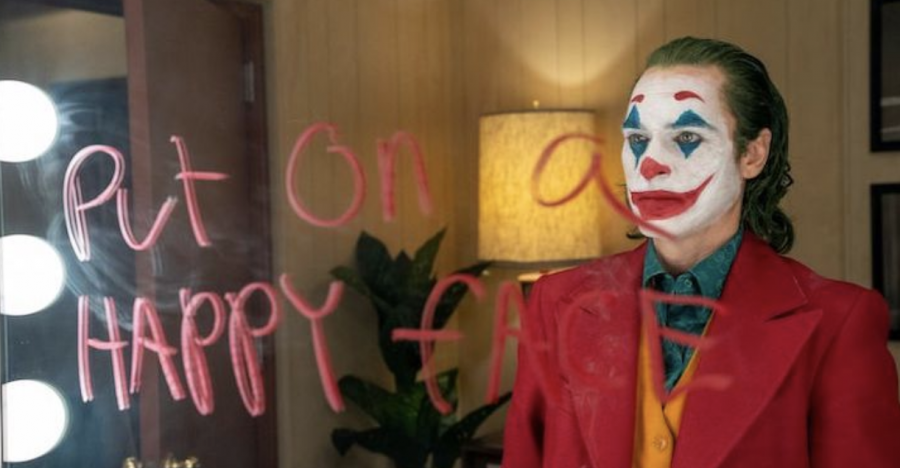Is Joker a hero or a villain in the fight for better mental health perception?
*Note that the following article contains spoilers for Joker, and discusses mental health. *
Todd Philips’ newest movie Joker tells the captivating story of how Arthur Fleck, a failed comedian, became one of DC Comics’ most famous supervillains. The movie dwells on each and every event that led this somewhat ordinary man into compete madness, transforming him into the criminal mastermind we know so well. In this reenactment of The Joker, actor Joaquin Phoenix interprets Arthur Fleck as a man who wears two masks: the mask of a playful Gotham-city clown, and the fake front of a hopeless attempt at feeling less isolated and lonely.
The movie shows scene after scene of profound suffering due to a series of events. This suffering, combined with a tenuous grip on reality, is what ultimately causes him to spiral into a psychopath. Phoenix’s interpretation of the man before the Joker caused some controversy. A number of critics and viewers defend the idea that the movie was “brutally honest” in its portrayal of mental illness, and applauded Todd Philips for providing a much-needed outlet for discussions on the importance of good mental health care. At the same time, others claimed that it was wrong for the movie to illustrate mental illnesses as an undeniable source of violence.
Jen Kantor, one of Graded’s social and emotional counselors, had lots to say in an exclusive interview with The Talon. When asked where she stood in this debate, she said that she found herself “somewhere in the middle.” While she agrees with some of the defenders’ claims that the movie raises a platform for healthy discussions, she can’t definitively say that the movie will have no negative consequences. Be that as it may, Ms. Kantor said that “the film made it very clear that [Arthur Fleck] had no support systems in place.” Scenes showing that lack of support followed by violent actions led the public to reflect upon how essential it is for people to get help when they need it.
Another person who shares this point of view is Jason Guerrasio, a journalist and film critic who wrote that “the movie is very much a commentary on how society doesn’t do enough to nurture people who experience mental illness.” In Joker, one of Arthur Fleck’s lowest moments is when he is notified that he will no longer get any medical assistance for his plethora of mental disorders, including schizophrenia, PTSD, and the pseudobulbar affect, known for causing his uncontrollable laughter. Unlike many others, he actually sought out help, but it wasn’t available to him. This was a crucial part of the movie and really showed how no appropriate care, especially when mixed with a terribly traumatic childhood, can be a recipe for disaster.
Another defining aspect of Arthur Fleck’s character is his dark humor–which is often more disturbing then it is comic. He keeps a journal where he writes down jokes, which is also an element deeply analyzed by movie critics. In his journal, he writes that “the worst part of having a mental illness is people expect you to behave as if you don’t.” Many people relate to this statement and praise the movie for making an effort to acknowledge things that are often concealed. Our counselor voiced how “it’s important to talk about things that are real and really happening,” and many others also argue that the inclusion of these kinds of comments is a way of removing the stigma so often associated with mental disorders. Basically, the argument here is that the only way to remove the negative connotation from the term “mental disorder” is by discussing it.
On the other hand, the depiction of a loner driven to criminal ends may incite violence, or lead the audience to inadvertently fear mental health disorders. Another film critic, Robbie Collin, described the movie’s protagonist as “an unstable, self-pitying loner with a mass-shooter mindset.” His statement resonated with some of Ms. Kantor’s main viewpoints. She talked about how currently, in the US, mass shootings are at an all-time high. Most of the time, “when there’s a mass shooting, it’s a straight white male.” If not, the attack is considered terrorism. However, for these white men, “it is seen as a mental health issue.” According to the Gun Violence Archive, as of September 3rd, 2019, the USA has had more mass shootings than days: 289 shootings in 246 days. Due to this, countless people say that the timing of the film’s release was not well thought out. One of the last scenes of the movie shows how protestors broke the Joker out of a police car in the midst of what looked like a violent riot. People wearing clown masks were vandalizing all of Gotham, going crazy in cult-like devotion to the supervillain. They showed no sign of sanity. They were inspired, rather than disgusted, by the Joker’s actions, and chose to follow him. This, to a much, much lesser extent, is what some are afraid might happen in our own communities.
Todd Philips’ Joker was watched by millions as soon as it was released, and as always, those who watched it had millions of reactions. However, in this case, Joker raised some important questions about the portrayal of mental illnesses in TV and film, and whether or not the re-enactment of this notorious character’s story was healthy for viewers to watch. At a time where terrible things like mass shootings are a problem to be reckoned with, many argue that the movie might insight more tragic acts. Some say that the story will enable people to relate to Arthur Fleck’s painful life, and chose the same path of destruction and darkness that he did. Others believe that the movie creates a much too strong link between people who suffer from mental illness, and violence. At the same time, there are those who argue that the movie, despite all the shocking scenes, left the audience reflecting about the importance of showing empathy and support to those who need it the most. Regardless of what opinion people might have in terms of the movie’s message, one thing is for certain; it definitely got us all talking about mental health.
Sources: Insider, Business Insider, The Guardian, Insider II

In these last hundred-ish days of quarantine, Luisa, commonly known as Luli, has been (surprisingly) productive. She has undertaken various art projects,...









